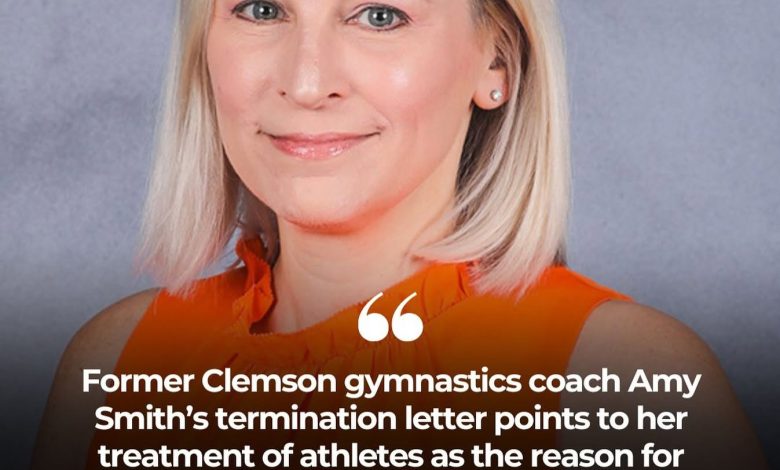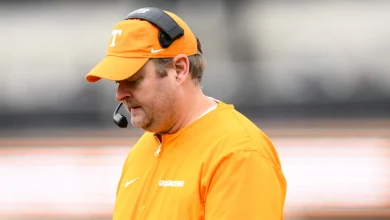Clemson parted ways with coach Amy Smith, citing contract violations involving athlete welfare, responsible treatment, and avoiding emotional or physical abuse.

In a striking move that reverberated across the collegiate athletics landscape, Clemson University parted ways with Amy Smith, the head coach of its newly established women’s gymnastics program. The termination, effective in April 2025, followed an internal investigation that found Smith in violation of multiple clauses in her employment contract—specifically concerning the treatment of student-athletes, their overall welfare, and safeguards against physical and emotional abuse.
While coaching dismissals are not uncommon in the high-pressure environment of NCAA sports, Smith’s departure is notable not only for the severity of the accusations, but also because it comes on the heels of early competitive success. Clemson’s decision underscores a shifting priority in college sports—placing athlete welfare and mental health on equal footing with winning records.
This report delves into the facts surrounding Smith’s termination, examines the broader implications for collegiate sports, and explores what this incident reveals about institutional responsibility, athlete-centered policies, and the evolving definition of abuse in the coaching profession.
Building a Program from the Ground Up
Amy Smith was hired in April 2022 as Clemson University’s first-ever head coach of women’s gymnastics. With the university launching the program from scratch, Smith was given a rare opportunity: to recruit an inaugural class, shape the team culture, and build a competitive squad from the ground up. Her prior experience included coaching stints at Utah State and North Carolina, as well as assistant roles at elite programs like UCLA.
Her selection was met with enthusiasm by some, but also with caution. Former athletes from past programs had voiced concerns online about Smith’s coaching methods, citing emotional distress and difficult team environments. Nevertheless, Clemson stood by its hiring process, emphasizing the background checks and evaluations that preceded Smith’s appointment.
Over the next two years, Smith’s team quickly found success. Clemson’s gymnastics program notched back-to-back NCAA Regional appearances, a second-place finish in the ACC championship, and even won its first NCAA play-in match in 2025. On the surface, the program appeared to be thriving.
But behind closed doors, a very different story was unfolding.
The Emergence of Athlete Complaints
In the fall of 2024, just over a year after the team’s inaugural season, reports began surfacing through Clemson’s anonymous ethics and athlete welfare hotline. According to multiple sources, athletes and support staff raised alarms over what they described as a “toxic team environment.” Allegations included emotional manipulation, verbal abuse, body-shaming, and instances of athletes being publicly humiliated or shunned for minor infractions.
Clemson responded by initiating a multi-step review. By January 2025, university officials had conducted a confidential climate survey and began holding one-on-one interviews with members of the team. Of the 20 gymnasts on the roster, 15 participated—an unusually high engagement rate, which strongly indicated that concerns were not isolated.
The university’s senior leadership, including Athletic Director Graham Neff and Associate Athletic Director Stephanie Ellison-Johnson, escalated the inquiry by initiating a midseason performance and culture review with Smith. These meetings focused less on wins and losses and more on the team’s culture, communication, and athlete well-being.
By March, the scope of the concerns had expanded. Parents of athletes were invited to meet with administrators, and further documentation was gathered regarding roster attrition, support staff turnover, and internal communications. Legal counsel was brought in during April to assess Clemson’s contractual options.
Termination for Cause: The Legal and Ethical Threshold
On April 18, 2025, Clemson formally notified Smith of her dismissal “for cause,” citing specific breaches of her contract. According to sources familiar with the decision, Smith was found to have violated clauses that required:
-
The responsible and ethical treatment of student-athletes
-
Concern for their physical and emotional welfare
-
Adherence to standards that prohibit physical or emotional abuse
The decision allowed Clemson to terminate Smith without owing a contractual buyout, a move that typically follows only the most serious policy violations. Importantly, the university emphasized that the action was not reactive or political—it was the result of an internal process grounded in due diligence, institutional values, and legal review.
Athletic Director Graham Neff later released a statement affirming the university’s stance:
“We place the highest priority on the holistic development, health, and well-being of our student-athletes. While competitive success is important, it cannot come at the expense of the environment we create for our students.”
Athlete and Parent Reactions: A Culture Under Strain
Following the dismissal, reactions from athletes and their families painted a clearer picture of the internal turmoil. Several parents wrote directly to the athletic department to thank administrators for listening to concerns and taking action. One parent wrote:
“No one wants to see someone lose their job. But our expectation is that the people in charge of our daughters’ health and education will treat them with basic dignity and respect. That wasn’t happening.”
Another parent described the emotional toll the season had taken on her daughter:
“It’s been a long, hard road. The girls have faced stress and adversity every single day. This isn’t what college athletics is supposed to look like.”
While no athlete has gone on the record with public accusations, several anonymous sources confirmed that the internal complaints included references to anxiety, loss of confidence, and unhealthy relationships between coaches and athletes.
Red Flags from the Past
Critics of Smith’s hiring argue that warning signs were visible well before Clemson offered her the job. While at North Carolina, athletes alleged that Smith made negative comments about their bodies and fitness levels. Former gymnasts from her time at Utah State have since spoken up anonymously online, describing high turnover, excessive emotional pressure, and fear-based coaching methods.
One former Utah State gymnast commented on Reddit:
“There were so many of us who left that team in 2019. It wasn’t just about being benched. It was the way we were spoken to, how our mental health spiraled, and how no one believed us.”
Although Clemson had vetted Smith’s prior employment, the lack of formal complaints or lawsuits may have contributed to an underestimation of the potential risks.
Institutional Response and Athlete Safety Protocols
Clemson’s response, while ultimately decisive, has also raised important questions about how universities monitor team cultures and prevent toxic coaching environments before they reach crisis levels.
To its credit, Clemson has invested in mental health support services, performance nutrition programs, and reporting infrastructure. However, the fact that the internal hotline received an “unprecedented spike” in reports suggests these systems may not have been trusted or visible enough early on.
The university has since pledged to review its oversight mechanisms and improve onboarding and monitoring for all athletic department hires.
Meanwhile, interim co-head coaches Justin and Elisabeth Howell, formerly of California, have taken the reins. The university canceled its summer camp session amid the leadership transition, disappointing some families but underscoring Clemson’s desire to reset the program’s trajectory responsibly.
A Broader Reckoning in College Athletics
The Smith incident is part of a broader national reckoning around coach behavior and athlete safety. In recent years, multiple NCAA programs have faced scandals related to abuse—both emotional and physical—with institutions ranging from LSU to Ohio State and UCLA under scrutiny.
These events are changing the expectations placed on collegiate coaches. Winning is no longer a shield against misconduct. Athlete welfare, mental health, and transparent communication are fast becoming baseline requirements, not “extra credit.”
The NCAA itself has implemented new guidance and policies for safeguarding athletes, including mandatory training on mental health, power dynamics, and ethical treatment.
Clemson’s decision to terminate Amy Smith was not made lightly. It came after months of documentation, feedback, and legal consideration. The fact that the university acted decisively—even amid the program’s early success—speaks to a growing culture of accountability in collegiate sports.
While this incident may serve as a painful chapter in Clemson’s gymnastics history, it can also be a turning point. By prioritizing athlete voices, enforcing contracts, and acknowledging cultural warning signs, Clemson set a precedent that other programs would do well to follow.
Ultimately, the heart of college athletics should never be gold medals or rankings—it should be the growth, safety, and well-being of the students who wear the jersey. In that regard, Clemson has taken a hard but necessary step forward.









